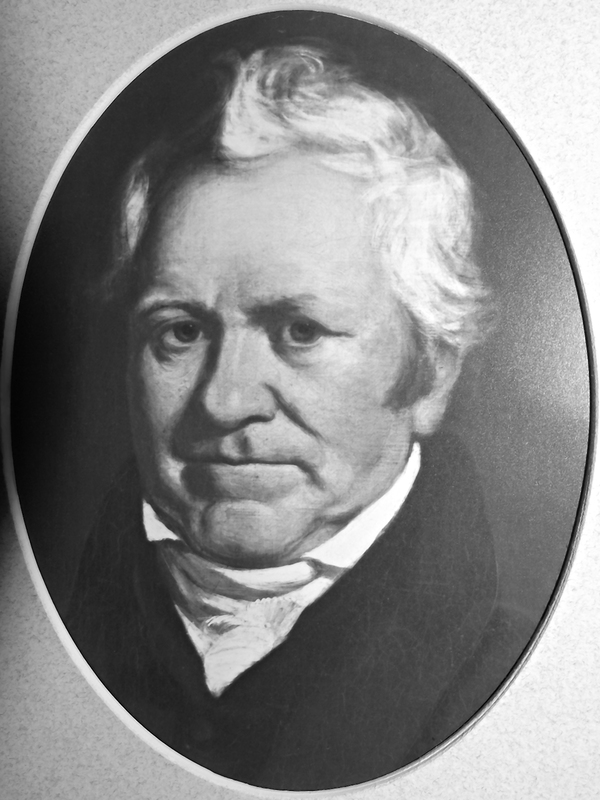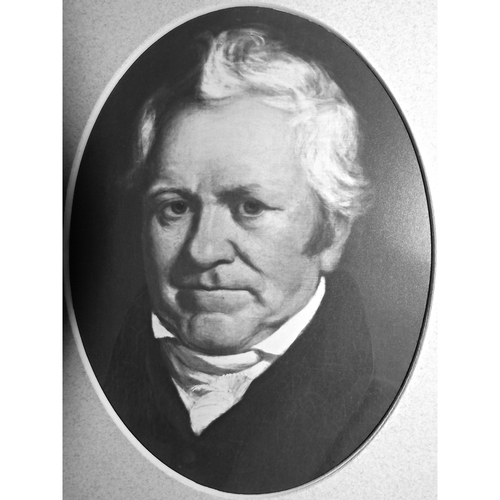
Source: Link
ROBINSON, JOHN, businessman, office holder, and politician; b. 1762 in the Highlands (Hudson Hills), near New York City, third son of Beverley Robinson and Susanna Philipse, and grandson of John Robinson, former president of the Council and administrator of Virginia; m. 1787 Elizabeth Ludlow, second daughter of George Duncan Ludlow*, chief justice of New Brunswick; d. 8 Oct. 1828 in Saint John, N.B.
A son of one of the most distinguished supporters of the British cause in New York, John Robinson was born to wealth and position and he remained a member of the loyalist aristocracy, which was to dominate the social and political life of New Brunswick during its first half-century. His education by private tutors on his father’s estates in New York was interrupted by the American revolution, during which, at the age of 15, he enlisted in the Loyal Americans, the regiment raised and commanded by his father. By 1781 he had survived the battle of Kings Mountain and achieved the rank of lieutenant. He retired on half pay at the conclusion of the war and, after a brief stay in the Annapolis region of Nova Scotia, settled in the Saint John River valley, likely in 1786.
The central fact in Robinson’s life and career was his membership in the Robinson family. His father was not only a wealthy loyalist refugee, he was a figure invested with great authority in his own lifetime, and around him much of the loyalist myth would gather. Each of his sons achieved distinction, the older ones in New Brunswick, the younger in the British army. John Robinson would eventually find himself at the centre of a network of relationships that comprehended most of the loyalist establishment of New Brunswick. His own marriage in 1787 made him a member of the Ludlow family; those of his brothers, children, nieces, and nephews would link him to the Barclays, Paddocks, Wetmores, Parkers, Hazens, Botsfords, Simondses, Millidges, and Jarvises.
It was from his father that John Robinson’s influence in New Brunswick at first derived. Although resident in England, Beverley Robinson was a member of the New Brunswick Council from 1784 until his death in 1792. In 1789 he was joined in this position by his eldest son, Beverley – former lieutenant-colonel of the Loyal American Regiment – who retained the office until 1816. During the years when his family was represented on the Council John Robinson was named to several prestigious and lucrative posts.
Shortly after his arrival in New Brunswick Robinson was created sheriff of Queens County, a high honour for a man not yet 26 years of age; from this early period he also held for a time the office of deputy adjutant-general of militia. Within a few years he had abandoned the ideal of a country gentleman’s life and joined the powerful commercial élite of the city of Saint John, setting up there as a general merchant. He became a popular figure in the city and was returned to the House of Assembly in 1802 at a general election which, despite the success of James Glenie*, was considered a defeat for the radicals and a triumph for the friends of Lieutenant Governor Thomas Carleton*. Robinson did not stand in the elections of 1809 but he was again returned to the house in a by-election held the following year. Although he was viewed as a political moderate, he generally supported the official party in the key issues of the period. His loyalty to the executive was rewarded with the office of acting deputy paymaster general of the forces during the War of 1812. Following the death of Amos Botsford*, Robinson was unanimously elected to the speakership of the assembly at its 1813 session. Three years later he resigned his seat in order to accept the office of province treasurer following the death of William Hazen. The province treasurer was responsible for receiving the revenues from the provincial customs and for the issue and payment of warrants authorized by the legislature through its appropriations bills. The office was in the gift of the lieutenant governor (whose office at the time of Robinson’s appointment was filled by an administrator, George Stracey Smyth) but, in contrast to those of the great offices of the crown, its salary and fees were set by the assembly. Robinson received £500 a year for his services as the province’s chief financial officer. He appears to have given up his mercantile concerns shortly after his appointment.
In May 1816, three months after he had accepted the office of treasurer, Robinson was appointed mayor of Saint John by his benefactor, Smyth. The new office possessed a wide-ranging authority. The mayor alone determined who should be admitted as freemen of the city and who should receive tavern and other city licences; the Mayor’s Court constituted the Inferior Court of Common Pleas for the city; the mayor served as chief executive officer for both the county and city governments of Saint John. The fees of office received for every warrant, certificate, and licence issued, and for every case heard, exceeded the salary that Robinson received from the treasurer’s office. He was an able mayor and enjoyed considerable support from the merchant community.
On 6 March 1818 Smyth completed the trinity of honours which he conferred on Robinson by calling him to the Council. Robinson thus became the third member of his immediate family to hold the highest office in the gift of the crown in New Brunswick. As a councillor he certainly participated in the discussions over crown lands which led to the imposition of timber duties and the subsequent constitutional debate over the casual revenues [see Smyth]. But his most important role was that of spokesman for interests advocating the creation of the Bank of New Brunswick in 1819. At the first stockholders meeting on 12 June 1820 Robinson was elected to the board of directors. That same day the directors promoted him to the presidency of the new institution. As province treasurer, Robinson was by far the bank’s most important customer and his election may be seen as the confluence of government and great merchant interests.
Indeed, perhaps the most interesting aspect of John Robinson’s career is the light it sheds on the relationship between government and business in loyalist New Brunswick and the questions it raises concerning the widely accepted view that the competing aspirations of the official and merchant communities formed the central political dynamic of the period. For Robinson neatly encompassed both traditions, as well as the military element that characterized loyalist society.
Robinson was a member of the Church of England and a supporter of the Society for Promoting Christian Knowledge. His seven children all made good marriages, three of the sons to daughters of Thomas Millidge* and Sarah Simonds (daughter of James Simonds). Four sons followed their father into public life. Beverley became treasurer of New Brunswick; George Duncan was elected assemblyman for Saint John; Daniel Ludlow became a barrister, and served as assemblyman for York County and registrar of the Court of Chancery; John Morris, also a barrister, became registrar of the Vice-Admiralty Court and master in Chancery.
Robinson retired from the Council of New Brunswick in 1826. He held the offices of mayor and province treasurer until his death on 8 Oct. 1828.
PANB, MC 1156, IV: 34. Winslow papers (Raymond). New-Brunswick Courier, 1811–12; 28 Jan. 1815; 15 March 1817; 11 Oct. 1828. Sabine, Biog. sketches of loyalists. Hannay, Hist. of N.B. Lawrence, Judges of N.B. (Stockton and Raymond).
Cite This Article
T. W. Acheson, “ROBINSON, JOHN,” in Dictionary of Canadian Biography, vol. 6, University of Toronto/Université Laval, 2003–, accessed December 31, 2025, https://www.biographi.ca/en/bio/robinson_john_6E.html.
The citation above shows the format for footnotes and endnotes according to the Chicago manual of style (16th edition). Information to be used in other citation formats:
| Permalink: | https://www.biographi.ca/en/bio/robinson_john_6E.html |
| Author of Article: | T. W. Acheson |
| Title of Article: | ROBINSON, JOHN |
| Publication Name: | Dictionary of Canadian Biography, vol. 6 |
| Publisher: | University of Toronto/Université Laval |
| Year of publication: | 1987 |
| Year of revision: | 1987 |
| Access Date: | December 31, 2025 |



